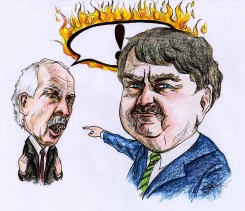Treachery is not a word used often outside the theatre — and for good cause. Accusing someone of an intent to betray a country or a cause should not be an action undertaken lightly. Last week, however, a small drama sparked up on Parliament Hill when Peter Kent, Environmental Minister in the Harper cabinet, accused two opposition MPs of harbouring such an intent. That Kent should have felt the need to use the word “treachery” is worrisome; that his accusations have largely escaped scrutiny is even worse. Furthermore, the lack of a fall-out or even follow-up by the media to his statements paints a very poor picture of Canadian politics.
[pullquote]“This is a f—king disgrace … closure again. And on the Budget! There’s not a democracy in the world that would tolerate this jackboot sh—”[/pullquote]
Last Tuesday, Claude Gravelle and Megan Leslie were in Washington, DC on a trip to speak to several US senators and congressmen about the Keystone XL pipeline. Both went to the US in their capacity as elected officials. Gravelle is the NDP’s critic for Natural Resources and Leslie is the NDP’ s Environment Critic. The next day, Minister Kent accused them of taking “the treacherous course of leaving the domestic debate and heading abroad to attack a legitimate Canadian resource.” Treachery and treason lie close together in a dictionary and closer still in meaning. Did Kent intend to accuse the pair of wanting to betray Canada? Or, worse, does Kent actually believe their visit to Washington is evidence of “treachery?”
Neither Kent nor the Conservative party will comment on his remarks.

Injurious and reckless rhetoric has become the hallmark of Canadian politics in recent years, and after the Conservative Party’s majority victory during last May’s election, it seems to have intensified. The same Wednesday that Kent made his accusations, NDP MP Pat Martin took to Twitter to express his anger with the Conservative government’s decision to invoke closure on debate of the federal budget: one tweet read “This is a f—king disgrace … closure again. And on the Budget! There’s not a democracy in the world that would tolerate this jackboot sh—”, while another, in response to a critic, was more succinct: “f—k you.”
There have been some other choice events over the last few months. Public Safety Minister Vic Toews accused NDP MP Joe Comartin of a “long and distinguished career of defending criminals.” House Leader Peter Van Loan claimed the opposition parties have begun hindering the Conservative agenda with “unreasonable” amendments to proposed bills and last Thursday’s Question Period featured as many as four “for Dummies” references, which says something unpleasant and a little sad about the cultural literacy around Ottawa.
Although politics has never been less than a full-contact sport, we should acknowledge that the state of our political discourse has been reduced to maladroit jibes notable only for their ugliness, and we should acknowledge that something is broken. Something has gone wrong in the way our political structures and media institutions are supposed to work, and this problem has only grown in the last five years. Ugly behaviour in individuals can be recognized and censured; ugly behaviour in institutions is a far more difficult problem to face, and this creeping rudeness threatens to reduce Canadian politics to taunts and vaudeville one-liners.
What should be done? While it would be nice to hope that issuing a complimentary etiquette book to every new MP would solve this problem in a matter of years, it seems like Canadians either must learn to adapt to this new, shrill culture or else start agitating for change. On the whole, improving political discourse must rank lower than improving our health care system or fixing our growing social inequalities, but it should still be a priority for any Canadian hoping to make Canada a better place. Good communication is the bedrock of good government, and every step taken to encourage a more polite environment on Parliament Hill can only result in a more harmonious society. Given how some members of the government react to criticism, though, it may be best to ask them very nicely first.

